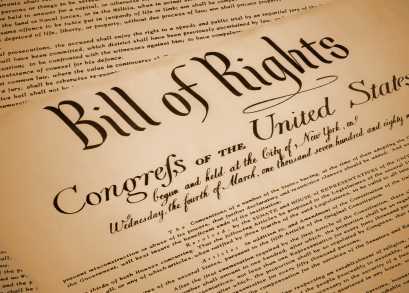"Awesome personalities think alike." When numerous extraordinary personalities of the states assembled to make another administration, two once in a while thought precisely similar. The Bill of Rights was made through the sort of open deliberation and trade of thoughts that it ensures right up 'til the present time. The Declaration of Independence expresses the reason for government is to secure our fundamental human rights.

This was one rule that every one of the Founders agreed on. Be that as it may, on the off chance that they made an incredible framework to secure rights, for what reason did they contend about a bill of rights?
Two gatherings framed amid the talk over a bill of rights. Federalists firmly upheld the Constitution as it was composed and did not think a bill of rights was required. Hostile to Federalists felt that a bill of rights would keep the focal government from debilitating states' power and be abusing natives. Federalists included Alexander Hamilton from New York and, at in the first place, James Madison from Virginia.
They trusted a bill of rights was not required in light of the fact that the Constitution itself constrained the administration's forces. They additionally expected that making a rundown of rights may prompt different perils. It is difficult to list each right. Federalists did not need certain rights to be disregarded in light of the fact that they were not recorded. Hostile to Federalists included George Mason and Patrick Henry of Virginia. They suspected that posting rights would help ensure against the great focal government taking ceaselessly the opportunities they had battled an upset to safeguard.
The Constitutional Convention finished in late 1787, yet the verbal confrontation went on. Nine states confirmed affirmed) the Constitution by the mid-year of 1788. In any case, New York, Virginia, and Massachusetts submitted not insignificant arrangements of proposed changes to ensure rights. It turned out to be clear the general population needed a bill of rights. Madison looked for the guidance of Thomas Jefferson, John Adams, George Mason and President George Washington.
They all communicated help with a bill of rights. Bricklayer recommended utilizing state presentations of rights as a guide. Madison altered his opinion and urged his kindred congressmen to help a bill of rights in 1789. Madison offered numerous proposed changes to Articles I and III of the Constitution on June 8, 1789. He initially rolled out little word increases and improvements to the first Constitution. Some Congressmen questioned, contending that Congress did not have the ability to change the first type of the Constitution.
They chose the Amendments would be included as a different rundown. The House of Representatives discussed through the late spring. On August 24, 1789, the House sent a rundown of seventeen corrections to the Senate. The Senate affirmed twelve. Those twelve were sent to the states for (endorsement). On December 15, 1791, Virginia's state tradition turned into the last to sanction the ten revisions that ensured rights. The Bill of Rights presently joined the Constitution as the representing archive of the United States.
The Bill of Rights constrained just moves made by the government against individuals. The Founders accepted natives would be ensured by their house states' constitution. Consequently, the Bill of Rights did not emphatically affect Americans' lives until the point that the Fourteenth Amendment was passed. The Fourteenth Amendment connected the Bill of Rights to state governments. In the twentieth century, the part of the government moved. Because of the government's extended part, its size, reason, and hugeness have changed. The change additionally influenced the national perspective of the Bill of Rights.